12, April 2020
Empty churches belie Trump’s Easter promise, highlight science’s role in keeping faithful safe 0
US President Donald Trump last month predicted “packed churches” on Easter Sunday despite a raging coronavirus death toll. His prediction has proved horribly wrong and highlights the inconsistencies populist leaders who have exploited religion now face.
Easter, Passover and the start of Ramadan all fall in April this year, a coincidence that, in normal times, would see millions of followers of the world’s major monotheist religions come together in congregational prayers or family gatherings.
But the coronavirus pandemic has physically atomised the faithful, with lockdown measures sparking unprecedented scenes of clergymen conducting Holy Week services in empty churches and cathedrals across the world.
Inside the fire-ravaged Notre Dame cathedral, Paris Archbishop Michel Aupetit joined a small group of priests for a Good Friday service minus a congregation commemorating one of Christianity’s holiest days as well as the first anniversary of the inferno that ravaged the Gothic landmark. In a haunting sight inside the Old City in occupied East Jerusalem on Friday, a handful of Franciscan friars in dark robes and face masks walked through deserted streets under the pelting rain along the Via Dolorosa, believed to be the path Jesus took to his crucifixion.
Saudi Arabia has already suspended the year-round umrah pilgrimage and has asked Muslims to delay their travel bookings to the holy cities of Mecca and Medina for the annual Haj in July and August amid questions over whether the world’s largest religious gathering can go ahead on schedule.
There’s no doubt however that the Muslim holy month of Ramadan, which begins around April 23, will be very different this year with the faithful unable to gather together for the iftar evening meal ending the day’s fasting.
Earlier this week, Jews across the world celebrated Passover with Zoom Seders instead of the traditional family gathering of generations around tables. Israeli authorities tightened the existing lockdown measures with a special nighttime curfew on Wednesday to dissuade visits and gatherings. Joining “grandma and grandpa” for a Seder, Israeli Defense Minister Naftali Bennett warned in a stark pre-Passover message, “could kill them”.
The deadly Covid-19 virus has killed more than 100,000 people across the world and it’s attacking what French sociologist Emile Durkheim identified as the fundamental purpose of religion: the social phenomenon of drawing communities together in rites and ritual observances. It is also exposing the fault lines between religious faith and science as well as tensions between spiritual and secular powers. The infectiousness of the disease has undermined the congregational nature of religious practices while the failures by some religious groups to follow social distancing has exacerbated the targeting and stereotyping of religious followers.
For populist leaders who have exploited religion to rise to power or maintain their political positions, the crisis “could threaten the foundations of their religious support base as well as their discriminatory policies towards religious or ethnic minorities”, noted James Dorsey, senior fellow at the Singapore-based S. Rajaratnam School of International Studies. This could play out in countries with “segments of ultraconservative religious communities that have different concepts of medicine or a blind faith in God to solve the problem”, explained Dorsey in a phone interview with FRANCE 24.
The health minister who put his faith in the Messiah
Tensions between the temple and laboratory were on stark display in Israel, where Health Minister Yaakov Litzman, a member of the ultra orthodox Ger Hasidic community, told Israeli media last month that he was “sure the messiah would come and save us”.
Litzman and his wife later tested positive for coronavirus, forcing several senior Israeli officials – including Prime Minister Benjamin Netanyahu and the head of the Mossad intelligence service – into quarantine since they had been in contact with the health minister who put his faith in the messiah.
Critics have called for Litzman’s resignation and dubbed him “Typhoid Miriam” after “Typhoid Mary”, the New York cook who infected dozens at the turn of the 20th century. Despite his cabinet position, Litzman’s “primary loyalty” was to the rabbinical leaders of his religious sect, Yehoshua Pfeffer, an ultra-Orthodox expert, told AFP. The health minister, Pfeffer noted, had failed to prevent members of his ultra-orthodox sect from conducting religious gatherings while the country had already imposed travel restrictions and banned mass events.
Netanyahu, who relies on the ultra-orthodox support base which makes up about 10 percent of the population, has struggled to enforce the closure of synagogues and yeshivas in places such as Bnei Brak, one of the country’s poorest, most congested cities and centre of the ultra-orthodox community. Members who live in self-imposed segregation have been particularly affected by the pandemic, with health authorities estimating that at least 38 percent of Beni Brak residents may be carrying the coronavirus.
The crisis has threatened Netanyahu’s coalition and its impact could stretch even deeper. The ultra-orthodox community’s disproportionate political influence and exemption from the country’s mandatory military service is a longstanding source of tension, with critics calling for the integration of the Haredim, as the community is called, into modern Israeli life.
The coronavirus crisis, Dorsey suggests, could also threaten the community from within. “In Israel, the ultra-orthodox live in their own world, they don’t listen to the media, they listen to the rabbi’s advice. The pandemic could undermine rabbinical authority on a scale not seen since the Holocaust, when rabbis advised members not to leave Europe and people paid a heavy price for that advice,” noted Dorsey.
Cow urine and #CoronaJihad in India
Political leaders who “seek religious legitimacy, cater to a religious support base or initially discarded scientific advice for expedient political reasons may have met their match in the coronavirus. Science has knocked religion and traditional healing methods out of the ring in the battle between rival approaches towards getting the coronavirus pandemic under control”, Dorsey noted in an April 7 blog, “Stopping COVID-19 in its tracks: Science gets the upper hand”.
In the first two weeks of March, while Italy was already under a nationwide lockdown, supporters of India’s Hindu right-wing Prime Minister Narendra Modi were hosting “gaumutra parties” across the country, where crowds, urged by saffron-robed religious leaders, gulped cups of cow urine which, they were told, was a miracle cure against the coronavirus.
Although some of the events were held by senior members of Modi’s Bharatiya Janata Party (BJP), the Indian prime minister — who relies on a vast vote base of Hindutva [or “Hinduness”] supporters to win elections — kept silent on the issue.
As the number of coronavirus cases in India mounted, Modi finally took to the airwaves towards the end of March to call on his countrymen to unite in the fight against coronavirus. In a widely hailed address devoid of Hindu supremacist bluster or anti-elitist or anti-Muslim rhetoric, Modi called for solidarity in the face of the deadly pandemic.
But weeks later, as the number of coronavirus cases in India mounted, national unity calls appeared to fall on deaf ears as hate crimes against Muslims spiked following a coronavirus contagion spread from a religious event organised by the Islamic missionary group, Tablighi Jamat.
As #CoronaJihad and #CoronaTerrorism trended on Twitter, with government spokesmen devoting more time to lambasting the Muslim religious gathering than measures to tackle the humanitarian fallout of a hastily-imposed nationwide lockdown, fake news reports began to swell on WhatsApp and other platforms. They, in turn, sparked anti-Muslim attacks across the country with at least one person killed in the eastern state of Jharkhand, according to Indian media reports.
Muslim missionary movement under scrutiny
The Tablighi Jamat movement has come under scrutiny in a number of countries for its role in spreading the coronavirus in Asia.
A missionary movement that originated in India in the 1920s, the Tablighi Jamat has branches across the world, including Asia, Africa, Europe and the US. Given the loose nature of participation and membership, follower estimates are hard to gauge, with the Pew Research Center noting they range from 12 to 80 million across roughly 150 countries.
An apolitical group focused on proselytizing and worship, the Tablighi Jamat is known for its khuruj – or proselytizing tours which see devotees, dressed in simple clothing, traveling for days, sometimes months, while sleeping in mosques and other religious sites. The group’s country branches also hold annual ijtema events, which can gather millions in countries such as Bangladesh, India and Pakistan.
A February 27 to March 1 ijtema in the Malaysian capital, Kuala Lumpur, which was attented by more than 16,000 people, including 1,500 foreigners, triggered the epidemic in Malaysia as well as in Brunei, with cases traced to Cambodia, Singapore, Thailand and the Philippines. It was followed by a mid-March ijtema near the Pakistani city of Lahore, which resulted in the spread of coronavirus as far afield as Gaza. It was cut short by Pakistani authorities last month.
In India, a gathering at the groups global spiritual centre, or markaz, in the Nizamuddin area of the Indian capital, New Delhi, was shut down on March 22, days before a nationwide lockdown went into effect at midnight, March 25.
While the religious group’s irresponsibility has been widely slammed, experts have noted that in India, a number of mass religious gatherings took place in the same period. These include a Sikh gathering in Punjab — where a single “super spreader” preacher who died of the virus sparked a quarantine of 40,000 people — and a Hindu temple festival in the southern state of Kerala. None of them sparked the level of public anger faced by the Tablighi Jamat.
Meanwhile, a more controversial breach of Modi’s strict nationwide lockdown occurred in Uttar Pradesh. Yogi Adityanand, the Hindu firebrand chief minister of India’s most populous state, led a ceremony to install a religious icon on a disputed religious site the morning after the lockdown was called. While the Uttar Pradesh police allowed the ceremony to go ahead, a criminal complaint was filed by the state’s police against the editor of the news site, The Wire, for covering the event, sparking condemnations from international press freedom groups.
Adityanath was allowed to perform the ritual with a select gathering of officials and religious supporters, sparking criticisms of elitism and hypocrisy that have also dogged Turkish President Recept Tayyip Erdogan.
Erdogan’s VIP prayers and Trump’s Easter prediction
On March 27, as Turkish Muslims were being urged to pray at home, Erdogan held a select Friday prayer service on the presidential palace grounds that has since been dubbed, “the VIP prayer”.
Photographs of the event was posted on Twitter by Diyanet, the country’s Religious Affairs Directorate that coordinates Turkey’s religious activities and has increasingly turned into a tool of Erdogan’s bid for leadership of the Sunni Muslim world.
Over the past few weeks, Turkey’s Diyanet has come under intense criticism for its failure to stem the spread of the epidemic. Some opposition politicians claim pilgrims returning home were given medication to conceal rising fever readings and allowed to return to their villages, spreading the epidemic to Turkey’s rural areas.
Religion and politics have a long, complicated history with each needing the other at different times in different ways in different places to survive. Blasting the role of the Evangelical movement in US politics in a New York Times column, author Katherine Stewart noted that “Donald Trump rose to power with the determined assistance of a movement that denies science, bashes government and prioritized loyalty over professional expertise.
“In the current crisis,” Stewart wrote, “we are all reaping what that movement has sown.”
Not all religious groups or leaders have been in opposition to science or public health directives. The vast majority of priests, imams and clergymen and women of different faiths across the world have seen no inconsistency in emphasising the importance of saving human life over the need for ritual gatherings.
But that depends on their acceptance of scientific principles and the primacy of the world of facts over issues of faith. The coronavirus pandemic is exposing the dangers of rejecting science for a blind acceptance of faith.
Last month, Trump was optimistic that the US would be “opened up and just raring to go by Easter”. The prospect of “packed churches all over our country”, Trump said, would make it “a beautiful time”. But as residents in his home city, New York, wake up to headlines of mass graves in the heart of the metropolis, Trump’s brash forecast of a beautiful Easter with packed churches is unlikely to be forgotten in some quarters, or forgiven in the spirit of the teachings of the risen Christ.
Culled from France 24

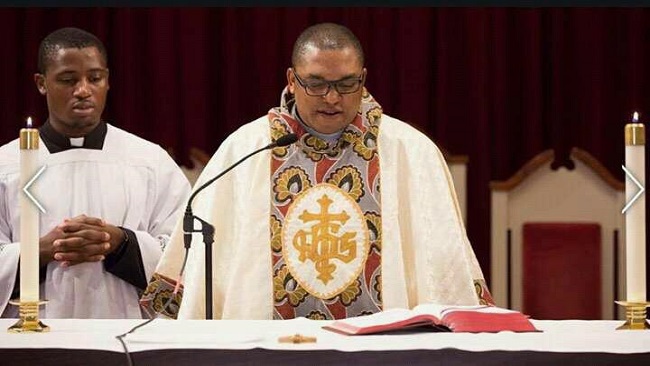

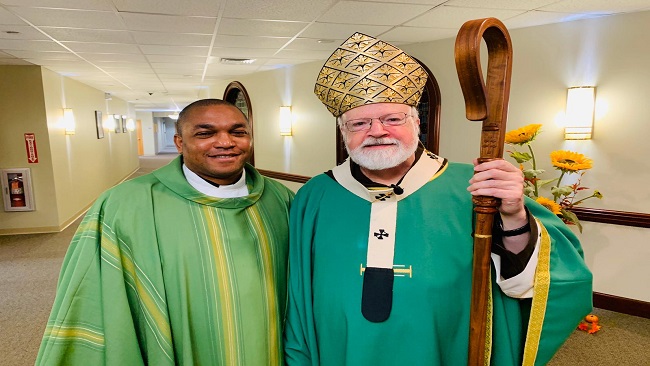
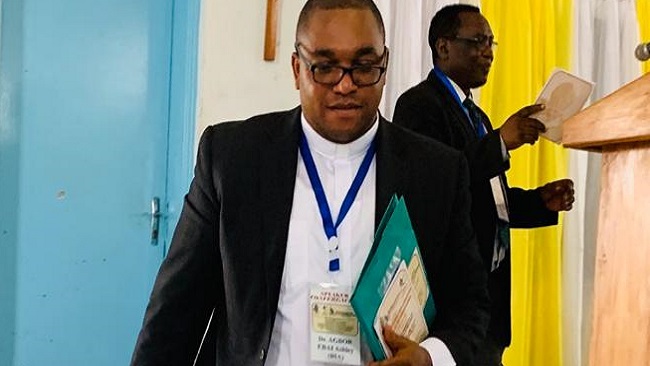
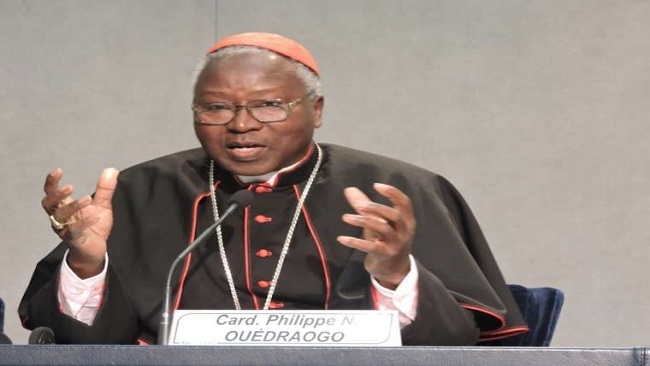
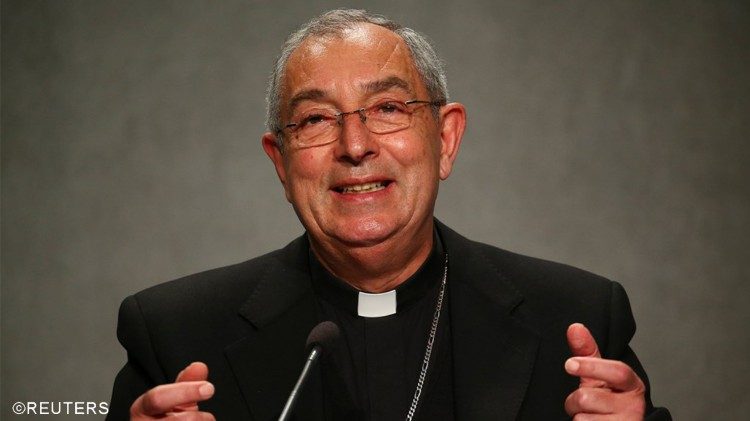
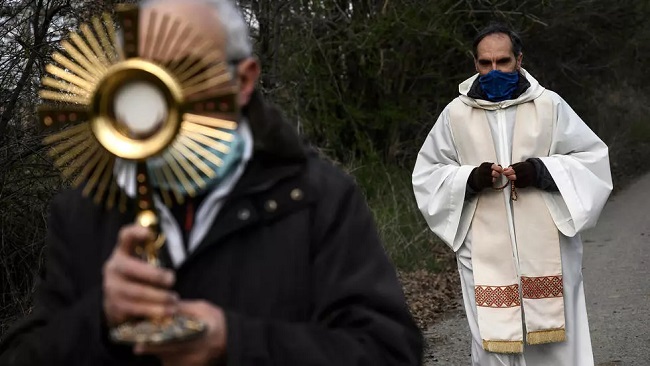
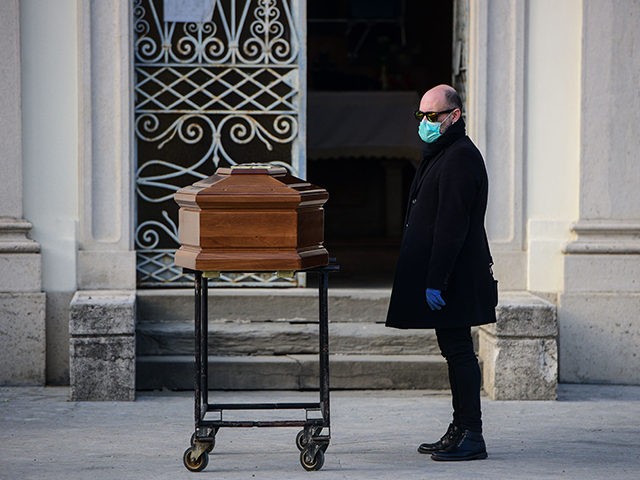
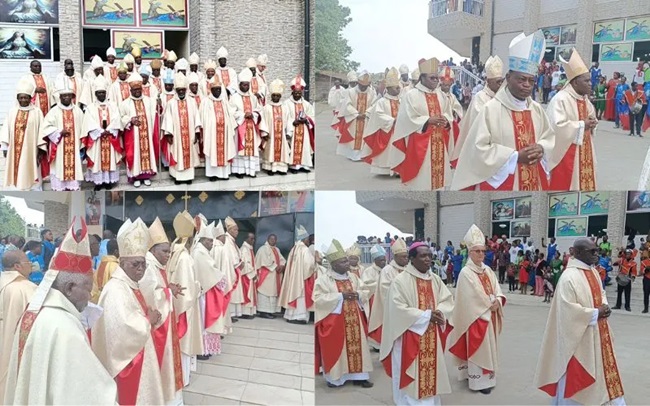

















13, April 2020
The Holy Father calls for global ceasefire amid Covid-19 pandemic in livestreamed Easter address 0
Pope Francis called on Sunday for global solidarity in fighting the coronavirus pandemic and its economic fallout, urging the relaxation of international sanctions, debt relief for poor nations and ceasefires in all conflicts.
“May Christ our peace enlighten all who have responsibility in conflicts, that they may have the courage to support the appeal for an immediate global ceasefire in all corners of the world,” the pope said in a live streamed Easter message.
He condemned arms manufacturing and said the pandemic should spur leaders to finally end long-running wars such as that in Syria. He also appealed for help for migrants and others suffering from existing humanitarian conflicts.
The pope also warned the European Union that it risked collapse if it did not agree on how to help the region recover.
The pope’s Easter “Urbi et Orbi” (to the city and the world) message, delivered from an empty St. Peter’s Basilica instead of to the usual crowd of tens of thousands in the square outside, was by far his most pressing and political since his election in 2013.
Saying the message of this year’s “Easter of solitude” should be a “contagion of hope,” he heaped praise on doctors, nurses and others risking their lives to save others and hailed those working to keep essential services running.
“This is not a time for indifference, because the whole world is suffering and needs to be united in facing the pandemic,” he said in the message, almost entirely dedicated to the pandemic’s effects on personal and international relations.
“Indifference, self-centredness, division and forgetfulness are not words we want to hear at this time. We want to ban these words forever!” he said.
Easter in the time of Covid-19
Francis expressed sympathy for those not able to bid farewell to their loved ones because of restrictions, for Catholics who have not been able to receive the sacraments and for all those worried about an uncertain future.
“In these weeks, the lives of millions of people have suddenly changed,” he said.
The pope said it was up to politicians and governments, too, to avoid “self-centredness” and take decisive, concerted action to help each others’ populations live through the crisis and eventually resume normal life.
“May international sanctions be relaxed, since these make it difficult for countries on which they have been imposed to provide adequate support to their citizens,” Francis said.
He also called for debt reductions or forgiveness for the poorest nations, without naming any countries.
Europe’s divisions
Francis expressed particular concern for the future of Europe, saying it was vital that rivalries that existed before World War Two “do not regain force” as a result of the pandemic.
European Union nations are divided over how to help the continent’s economy recover – with Italy and other eurozone members seeking the issuance of euro bonds backed by all, but Germany, the Netherlands and other countries opposed to this.
“The European Union is presently facing an epochal challenge, on which will depend not only its future but that of the whole world,” Francis said.
That echoed a position by Italian Prime Minister Giuseppe Conte, whose country has suffered one of the highest death tolls from Covid-19.
“This is not a time for division,” Francis said.
(FRANCE 24 with REUTERS and AFP)